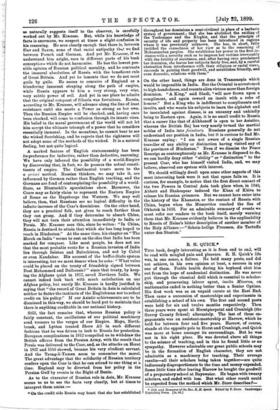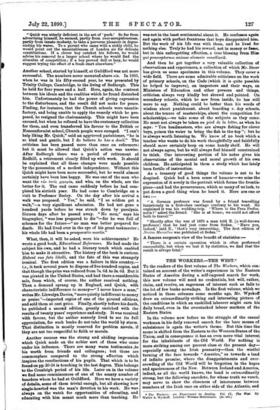R. H. QUICK.*
THIS book, deeply interesting as it is from end to end, will be read with mingled pain and pleasure. R. H. Quick's life was, in one sense, a failure. He held many posts, and did not achieve, in his own opinion at least, a success in any one of them. Feeble health during his boyhood shut him out from the hope of academical distinction. He was never put through the classical drill which is essential to scholar- ship, and persevering labour spent, invita Minerva, on mathematics ended in nothing better than a Senior Optime. His first work was as an unpaid curate at the East End. Then came a succession of mastership and experiments in establishing a school of his own. The first and second posts were held for six and twelve months respectively. Then three years were spent at Hurstpierpoint and Cranleigh (the Surrey County School) alternately. The last of these en- gagements was an assistant-mastership at Harrow, which he held for between four and five years. Harrow, of course, stands at the opposite pole to Hurst and Cranleigh, and Quick was more at home amongst its surroundings. But he was not in his right place. He was devoted above all things to the science of teaching, and in this he found little or no sympathy. However admirable our great public schools may be in the formation of English character, they are not admirable as a machinery for teaching. Their average results—all their scholars being taken together—are quite ludicrously disproportionate to the time and money expended. Some little time after leaving Harrow he bought the goodwill of a preparatory school at Bayswater. He began with twenty scholars, and ended with less. But what other result could be expected from the method which Mr. Storr describes?- * Life and Remains of the Rev. R. H. Quick. Edited by F. Storm Cambridge: University Press. (is. ed.] "Quick was utterly deficient in the art of push.' So far from advertising himself, he seemed, partly from over-scrupulousness, partly from innate modesty, to take a perverse pleasure in depre- ciating his wares. To a parent who came with a sickly child, he would point out the unsuitableness of London air for delicate constitutions. If a clever boy outshot his fellows, he would advise his removal to a larger school where he would find the stimulus of competition ; if a boy proved dull or lazy, he would suggest trying the effect of a fresh start elsewhere."
Another school, started by himself, at Gnildford was not more successful. The numbers never mounted above six. In 1883, when he was in his fifty-second year, he was presented by
Trinity College, Cambridge, to the living of Sedbergh. This he held for four years and a half. Here, again, the contrast
between his ideals and the realities which he found disturbed him. Unfortunately he had the power of giving expression to the disturbance, and the result did not make for peace. Finding, for instance, that the Church schools were unsatis- factory, and being unable to apply the remedy which he pro- posed, he resigned the chairmanship. This might have been excused, but when he refused to have the customary collection for them, and even transferred his favour to the British or Nonconformist school, Church people were enraged. "I can't help liking Mr. Quick," said an aggrieved parishioner, "he is so kind and gentle, but I do believe he has a devil." The criticism has been passed more than once on reformers; but it must be allowed that Quick's action was unwise. After Sedbergh there was a period of retirement at Redhill, a retirement closely filled up with work. It should be explained that all these changes were made possible by the possession of a modest independence. Without this Quick might have been more successful, but he would almost certainly have been less happy. He was one of the men who want the TZU .tsr%■.; xopr,7ice, and who, on the whole, are the better for it. The end came suddenly before he had com- pleted his sixtieth year. He had come to Cambridge on a visit to Professor Seeley. On the day after his arrival a walk was proposed. " Yes," he said, "I so seldom get a walk,"—a very significant admission. He had not gone a hundred yards before he was struck down by paralysis. Sixteen days after he passed away. "No man," says his biographer, "was less prepared to die "—for he was full of schemes for the future—" no man was better prepared for death. He had lived ever in the eye of his great taskmaster ; his whole life had been a praeparatio mortis."
What, then, it will be asked, were his achievements ? He wrote a good book, Educational Reformers. He had made the subject his own, and be had a literary touch which enabled him to make it attractive. The history of the book is curious. Habent sua fata libelli, and the fate of this was strangely ironical. The first edition was a failure in this country,- i.e., it took several years to dispose of five hundred copies, and that though the price was reduced from is. 6d. to 3s. 6d. But it was pirated in the United States, and had there a considerable
sale, from which, of course, the author received nothing. Then a demand sprang up in England, and Quick, with
characteristic indifference to money—" I never knew a man," writes Mr. Llewelyn Davies, "more quietly indifferent to money or praise "—imported copies of one of the pirated editions, and sold them at cost price. Finally, shortly before his death, he published a second edition, greatly enriched with the results of twenty years' experience and study. It was received with favour, but the author scarcely lived to see its full appreciation, for such books do not take the world by storm. That distinction is mostly reserved for problem novels, if they are not too respectful to faith or morals.
Another success was the strong and abiding impression which Quick made on the nobler sort of those who came under his influence. There are many warm testimonies to his worth from friends and colleagues ; but these are commonplace compared to the strong affection which inspires the recollections of his pupils. That which is to be found on pp. 20-24 is touching in the last degree. This belongs to the Cranleigh period of his life. Later on in the volume we find some reminiscences of one of the scanty number of boarders whom he had at Guildford. Here we have a variety of details, some of them trivial enough, but all showing how single-hearted was the man's devotion to his work. He was always on the watch for opportunities of educating, and educating with him meant much more than teaching. He was not in the least sentimental about it. He confesses again and again with perfect frankness that boys disappointed him. But the work of his life was with them, and he lived for nothing else. Truly he had his reward, not in money or fame, but in this nnforgetting affection, a true blessing from Him qui praeceptorum animos alumnis conciliavit.
And then he got together a very valuable collection of observations and experiences, a collection of which Mr. St,orr
has given us some specimens in this volume. They cover a wide field. There are some admirable criticisms on the work
of primary schools, on the Code (which it is quite possible he helped to improve), on inspectors and their ways, on Ministers of Education and other persons and things, criticism always very kindly but shrewd and pointed. On secondary schools, which he saw from inside, he has still more to say. Nothing could be better than his words of wisdom about punishment, about boarding v. day schools, about the tenure of masterships, about the competition for scholarships,—we take some of the subjects as they come. He must not always be taken au pied de la lettre, as when be says "You headmasters, who are always fishing for clever boys, poison the water to bring the fish to the top "; but he is always worth listening to. We know of no book which a teacher who wants to do his work thoughtfully and faithfully should more certainly keep on some handy shelf. He will not always agree, but he will always feel himself constrained to think. One interesting portion of his notes gives his observations of the mental and moral growth of his own children. He anticipated in them a study which has lately
been fertile of instruction.
As a treasury of good things the volume is not to be despised. Quick had a keen sense of humour—we miss the expression of it sorely in the portrait which forms the frontis- piece—and had the perseverance, which so many of us lack, to put down a good thing when he heard it. Here are one or two :—
"A German professor was found by a friend travelling luxuriously in a first-class carriage contrary to his wont. He explained it was his wedding-trip. Where is the Frau Profes-
sorin ? ' asked the friend. She is at home ; we could not afford both to travel."
"Shortly after the war of 1870 a man told E. [a well-known
professor] that he had just come from Sedan. Have you, indeed,' said E., that's very interesting. The first edition of Noving Mareellu. was published at Sedan.'"
A famous surgeon's view of the benefit of statistics :—
" There is a certain operation which is often performed successfully, but when we test it by statistics, we find that the result is always fatal."



































 Previous page
Previous page